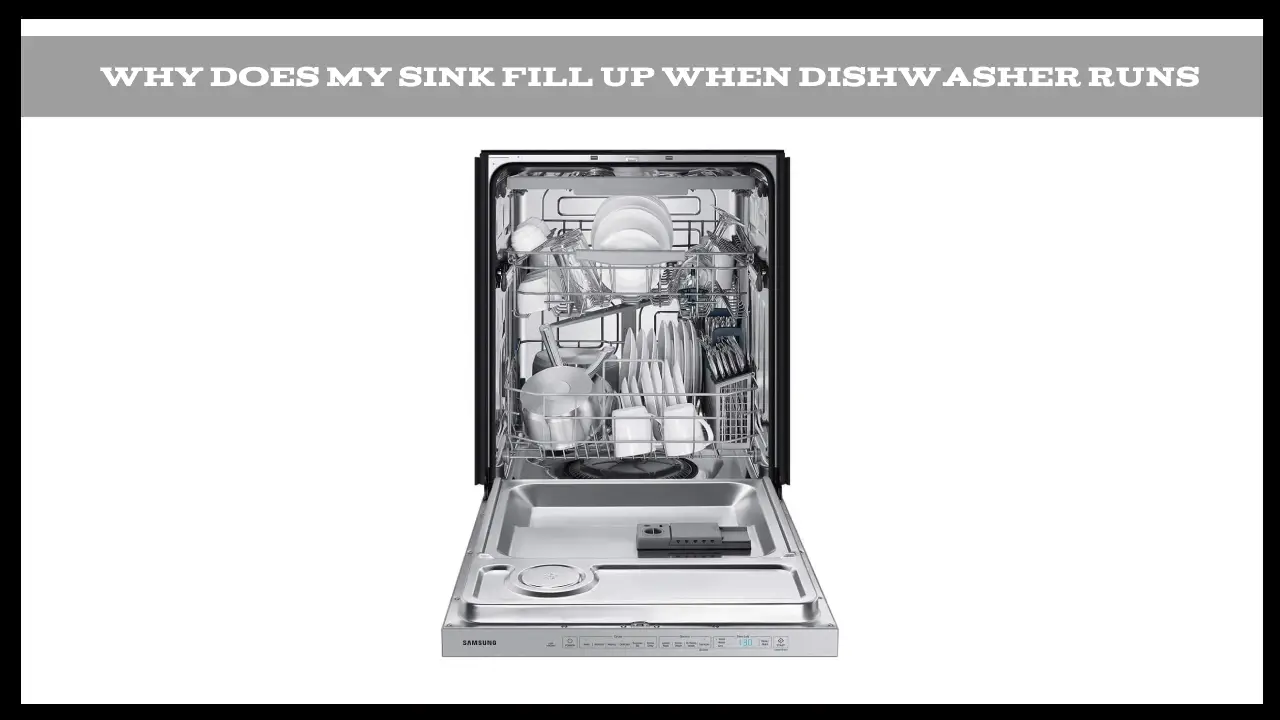When your dishwasher runs, it’s supposed to make your life easier, but a sink filling up with water can quickly turn convenience into frustration. Understanding why this happens is crucial not only to maintaining your kitchen’s functionality but also to preventing potential damage. This detailed guide will walk you through the common causes, solutions, and preventive measures to keep your sink and dishwasher working harmoniously.
Table of Contents
Why Does My Sink Fill Up When the Dishwasher Runs?
When your sink fills up while the dishwasher is running, it’s often due to a blockage or improper drainage in your plumbing system. Dishwashers typically drain wastewater through a series of pipes that connect to your home’s plumbing. If there’s a clog in the drain line or the air gap (if you have one), it can cause water to back up into the sink instead of flowing freely down the drain.
Another possible reason could be related to how your dishwasher is connected to your sink’s drainage system. If both appliances share the same drain line, and there’s insufficient venting, it can create negative pressure that pulls water from the sink when the dishwasher drains. In either case, it’s advisable to check for clogs and ensure proper installation of both appliances to prevent this issue from recurring. If you’re unsure about how to proceed, consulting a plumber may help resolve the problem efficiently.
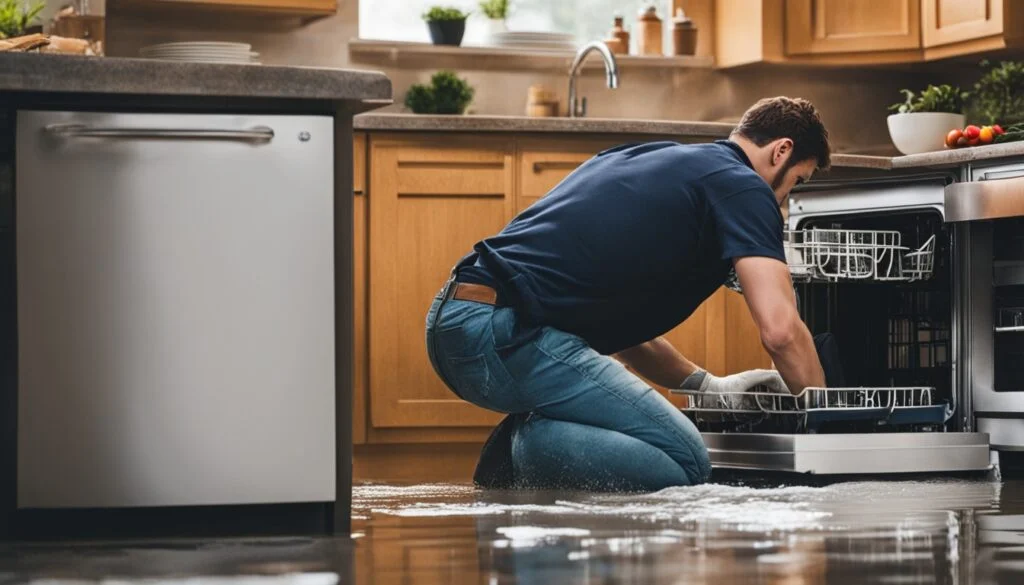
Understanding the Connection Between Your Sink and Dishwasher
Your sink and dishwasher are more connected than you might realize. Both appliances typically share the same drainage system. When your dishwasher drains, it expels water through a hose that connects to the sink’s plumbing. Ideally, this water flows smoothly down the drain. However, if there’s a blockage or other issue, water can back up into the sink instead of draining away.
How Your Dishwasher Drains
The dishwasher pump sends wastewater out of the dishwasher and into the drain line. This drain line usually connects to the garbage disposal or directly to the sink’s drain. If everything is working correctly, the water flows freely into the drain and out of your home. But when there’s a problem, the water can’t flow as it should, causing it to back up into the sink.
Common Causes of Sink Backup When the Dishwasher Runs
Several factors can contribute to your sink filling up when the dishwasher is in use. Identifying the root cause is the first step in solving the problem. Below, we’ll explore the most common issues.
1. Clogged Garbage Disposal
One of the most frequent causes of a sink backup is a clogged garbage disposal. When the disposal is full of debris, it can block the water from draining properly. As a result, when the dishwasher tries to expel water, it has nowhere to go but back into the sink.
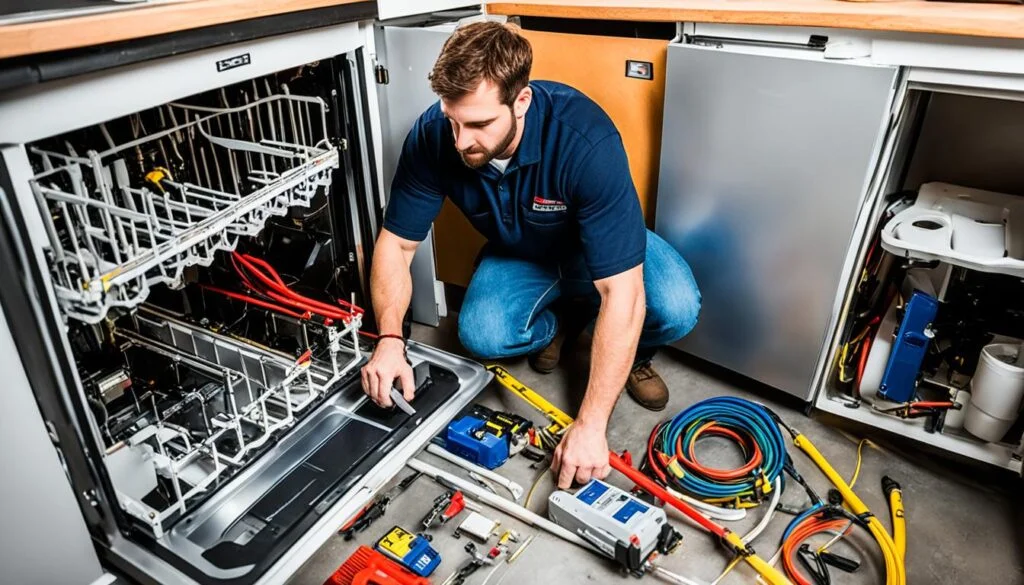
Solution:
To address this, try running the garbage disposal to clear out any blockages. If the disposal is still clogged, you may need to manually clean it out. Be sure to disconnect the power before attempting any maintenance to avoid injury.
2. Blocked Sink Drain
A blocked sink drain can also cause water to back up when the dishwasher is running. Over time, grease, food particles, and soap scum can build up in the drain, leading to a blockage.
Solution:
You can try using a plunger to dislodge the blockage. If that doesn’t work, a drain snake may be necessary to clear out more stubborn obstructions. In some cases, a professional plumber may need to be called in to thoroughly clean the pipes.
3. Improper Installation of Dishwasher Drain Hose
If your dishwasher drain hose is not installed correctly, it can lead to water backing up into the sink. The hose should be looped higher than the sink’s drain to prevent water from flowing back into the dishwasher or sink.
Solution:
Check the installation of the drain hose. Ensure it has a high loop or is connected to an air gap, which is a device that prevents backflow. If you’re unsure how to check this, it may be wise to consult the dishwasher’s manual or hire a professional to assess the installation.
4. Ventilation Issues in the Plumbing System
Your home’s plumbing system relies on proper ventilation to maintain the right pressure in the pipes. If there’s a problem with the venting, such as a blocked vent pipe, it can cause drainage issues, including water backing up into the sink.
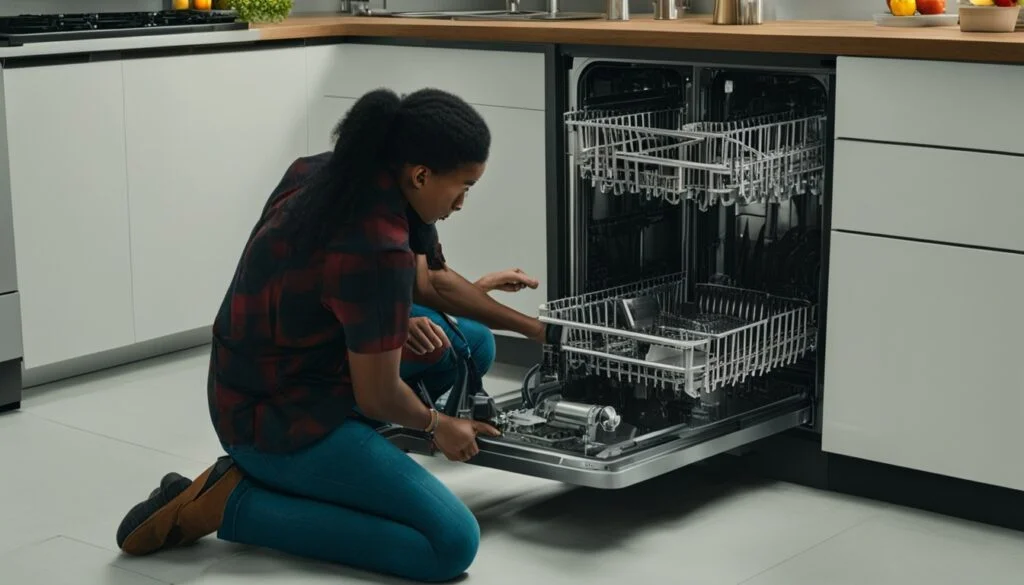
Solution:
Inspect the vent pipes for any blockages or damage. This might involve climbing onto the roof, as the vent pipes usually extend out of the house. If you’re not comfortable doing this, a professional plumber can help.
5. Full or Clogged Dishwasher Filter
Dishwashers have filters that catch food particles and debris. If these filters are full or clogged, it can impede the dishwasher’s ability to drain water properly, leading to a backup in the sink.
Solution:
Regularly clean the dishwasher filter according to the manufacturer’s instructions. This will help ensure that water drains smoothly and doesn’t back up into the sink.
Preventive Measures to Avoid Sink Backups
Prevention is always better than cure. By taking a few proactive steps, you can avoid the hassle of dealing with a sink that fills up when your dishwasher runs.
1. Regular Maintenance
Keep your garbage disposal and sink drains clean. Regularly run hot water down the drain to help dissolve grease and other debris. Consider using a biodegradable drain cleaner once a month to prevent buildup.
2. Proper Use of Dishwasher
Ensure that you’re not overloading the dishwasher and that you’re scraping off food particles before placing dishes inside. This will reduce the likelihood of clogs forming in the drain line.
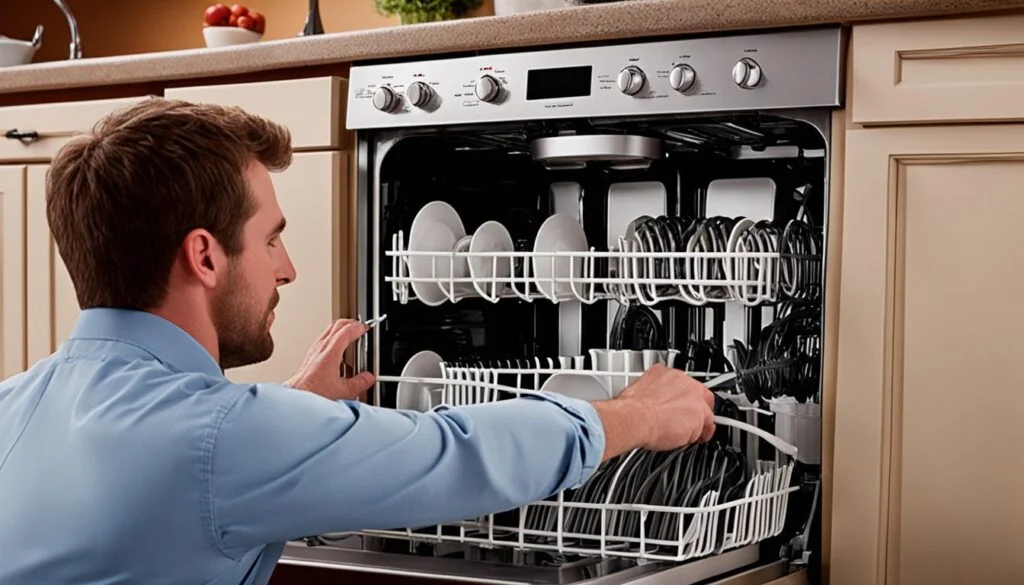
3. Professional Inspection
Have your plumbing system inspected by a professional once a year. They can identify and fix potential problems before they lead to backups.
4. Upgrade Plumbing if Necessary
If your home’s plumbing is old or prone to issues, it might be time for an upgrade. Modern plumbing systems are designed to handle the demands of today’s appliances more efficiently.
When to Call a Professional
While some of the solutions mentioned above can be handled by homeowners, there are times when it’s best to call in a professional. If you’ve tried the basic troubleshooting steps and the problem persists, or if you’re dealing with frequent backups, a plumber can provide a more thorough diagnosis and solution.
Signs You Need Professional Help:
- Water backs up even when the dishwasher isn’t running.
- You notice foul odors coming from the drain.
- The dishwasher or sink drain is making unusual noises.
- Multiple drains in your home are backing up simultaneously.
Conclusion
Dealing with a sink that fills up when the dishwasher runs can be a frustrating experience, but it’s not an insurmountable problem. By understanding the common causes and implementing the suggested solutions and preventive measures, you can keep your kitchen running smoothly. Regular maintenance and timely professional intervention are key to avoiding more serious plumbing issues down the line.

FAQs
1. Why does my sink fill with water when the dishwasher runs?
When your dishwasher runs, it shares the same drainage system as your sink. If there’s a blockage in the drain, the water has nowhere to go and backs up into the sink.
2. Can a clogged garbage disposal cause the sink to back up when using the dishwasher?
Yes, a clogged garbage disposal is one of the most common causes of sink backups when the dishwasher runs. Debris in the disposal can block the drain, causing water to back up into the sink.
3. How do I fix my sink when it fills up during the dishwasher cycle?
First, run the garbage disposal to clear any blockages. If the problem persists, check for clogged sink drains, clean the dishwasher filter, and ensure the dishwasher drain hose is installed correctly.
4. Is it safe to use chemical drain cleaners to fix a sink backup?
While chemical drain cleaners can sometimes clear minor clogs, they are not always effective and can damage your pipes over time. It’s better to use a plunger, drain snake, or call a professional if the clog is severe.
5. How can I prevent my sink from backing up when the dishwasher runs?
Regularly maintain your garbage disposal and sink drains, clean the dishwasher filter, and ensure proper installation of the dishwasher drain hose. Regular inspections and preventive measures can also help.
6. Should I be concerned about a sink backup when my dishwasher runs?
Yes, a sink backup can indicate a plumbing issue that, if left unresolved, could lead to more significant problems, such as water damage or extensive plumbing repairs.
7. What should I do if the problem continues after trying basic fixes?
If the problem persists after trying to clear clogs and checking the drain hose, it’s best to call a professional plumber. They can diagnose the issue more accurately and provide a long-term solution.
8. Can improper dishwasher installation cause sink backups?
Yes, if the dishwasher drain hose is not installed with a proper high loop or air gap, it can cause water to back up into the sink during the dishwasher cycle.
9. What is an air gap, and how does it help with sink backups?
An air gap is a device installed between the dishwasher and the sink drain to prevent backflow. It helps ensure that water only flows out of the dishwasher and into the drain, not back into the dishwasher or sink.
10. How often should I clean my dishwasher filter to prevent backups?
It’s recommended to clean your dishwasher filter every one to three months, depending on how frequently you use your dishwasher. Regular cleaning prevents clogs and ensures proper drainage.

